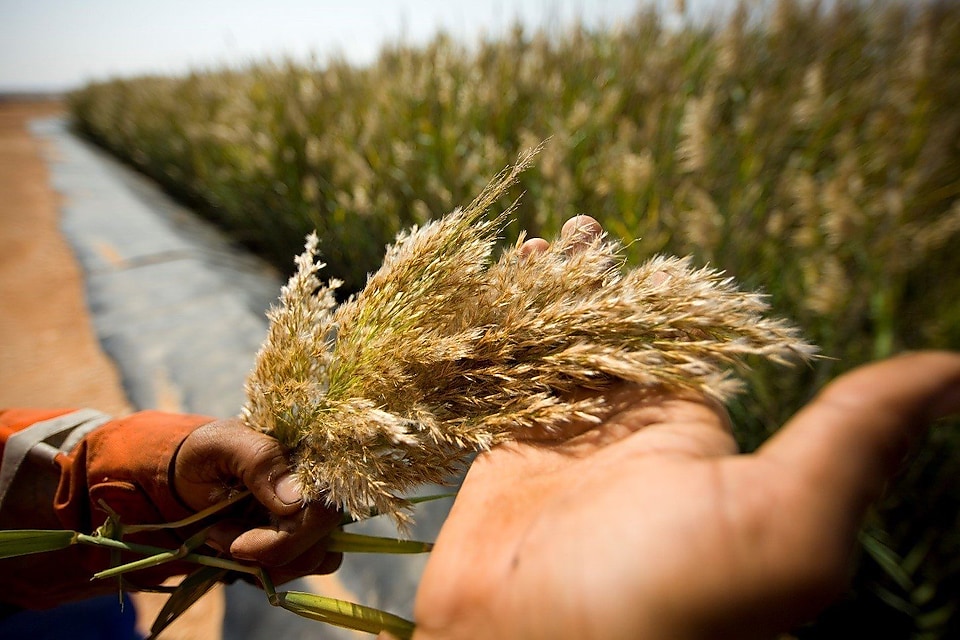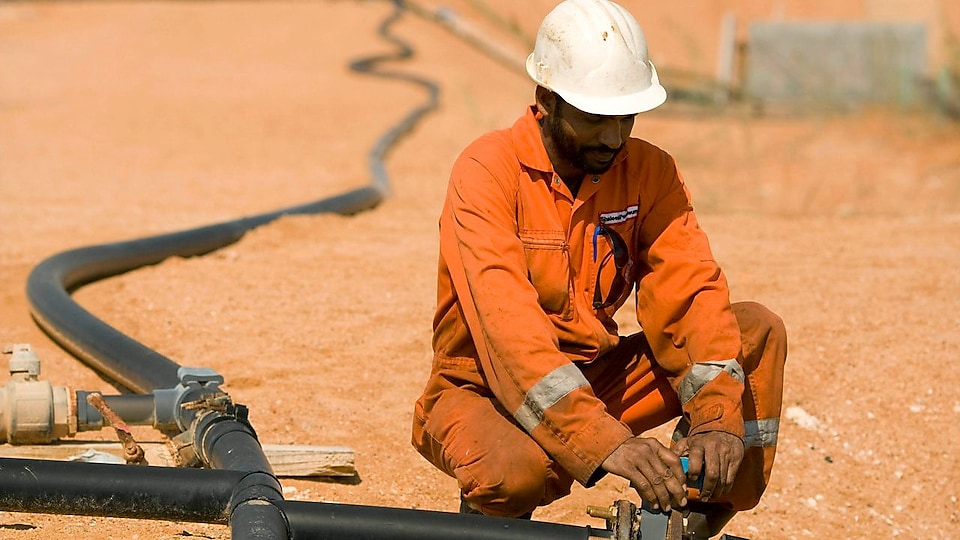
Reusing and recycling water
We take steps to manage our use of water responsibly – including looking for beneficial ways to recycle and reuse this valuable resource.
Read how we manage water responsibly
Extracting oil sometimes produces a lot of water, which must be carefully cleaned before it is disposed. In the Omani desert, reed beds are being used to naturally clean the water that is extracted in this process so that it can be recycled for other purposes.
Shell Oman: a natural way to filter water
Shell Oman: a natural way to filter water
Duration: 1:48 minutes
Transcript
[Music plays]
[Caption]
A natural way to filter water
In the desert of Oman, water is being cleaned using only reeds, gravity, sunlight ... and hungry microbes
[Visuals]
Shots throughout the video show the Nimr oil fields, pumps and the surrounding desert and the fields of reeds.
[Voice over]
At the Nimr oilfields in Oman, thousands of barrels of oil are produced every day. But only a tenth of liquid brought to the surface is actually oil - the rest is water, which must be cleaned and disposed of.
In the past, Petroleum Development Oman has pumped the water back underground. But this is costly, and uses energy.
A new approach uses reed beds to purify the water before it evaporates naturally beneath the desert sun.
Using the new technique, most of the crude oil is first separated from the water. Traces of oil, however, remain in the water. Pulled only by gravity, the oily water then flows downhill through about one and a half kilometres of reeds.
As it passes through, the oil sticks to the reeds, and is eaten by natural microbes living on the plant. By the time it reaches the bottom of the fields, the water is 99.5% pure, and can be left to evaporate safely in the sun.
[Caption: Roman Breuer, Bauer Umwelt, GmbH, Oman]
"The four purification stages have removed everything that's left after the oil has been separated. The reeds have also dealt with the organic substances dissolved in the water".
[Voice over]
After a successful trial, the plant has been expanded to more than double its size. Engineers also hope that the process can soon be used elsewhere.
[Caption: Roman Breuer, Bauer Umwelt, GmbH, Oman]
"A plant like this could reduce energy consumption for water purification to almost zero".
[Caption]
Thanks to Bauer Resources GmbH
In a remote corner of Oman’s vast interior desert, migratory birds, including flamingos, are settling while insects, small reptiles and even fish have been spotted. This abundance of wildlife is a product of an innovative and successful environmental stewardship project, the Nimr reed beds.
Read the story "How nature helped solve an industry challenge"

The reeds themselves form a wetland covering around 5.1 million square metres of previously arid desert. They are irrigated by water that is a by-product of oil production activities in Nimr, carried out by Petroleum Development Oman (PDO) in which Shell holds a 34% interest. The field has long been characterised by the high percentage of water that also comes to the surface with the oil.
Since 2011, a sizeable proportion of Nimr’s produced water – currently some 175,000 cubic metres of it per day – has been flowing into a special treatment plant operated on PDO’s behalf by the environmental services company Bauer Nimr. The facility incorporates a clever settling tank and centrifuge systems that remove any residual traces of oil (which are reclaimed) before the water flows into the beds to be cleaned by microorganisms that live among the roots of the reeds as well as by algae.
Because the whole facility is constructed on a man-made slope, the water requires no pumping or other mechanical stimulus to flow through it, making the plant both highly energy-efficient and extremely reliable.
Thanks to this unique, natural process the water taken from the beds is pure enough to be used for drilling new wells, which saves pumping clean water from shallow aquifers. PDO also draws on it to help make up the polymer mixtures used in its chemical EOR (enhanced oil recovery) project in Mamul, and it can be used for hydraulic fracking, which is a process by which high pressure water injection is deployed to fracture reservoir rock in order to improve its permeability.
Outside of oilfield operations, PDO is investigating the potential of earmarking some of the water to irrigate crops that are tolerant to high levels of dissolved salt – so-called biosaline agriculture.
PDO and Bauer Nimr have been running a three-year research project to study the impact of treated produced water on 13 different plant species and its commercial viability. For example, eucalyptus, acacia, conocarpus, casurian and prosopis are being grown on a 20-hectare plot and cotton has also been harvested there. It has seen promising plant growth from numerous crops with the potential for commercial application as well as the possibility of producing biomass and oil seeds.
PDO is also working with Sultan Qaboos University in Muscat to use local soil and low-salinity treated produced water to manufacture compressed stabilised soil blocks. The bricks, which could reduce building costs, are currently being tested for their strength and thermal conductivity.
After all these practical uses have taken their share of water, any remaining liquid is passed into giant evaporation ponds to let nature take its course. PDO then plans to harvest the salt deposits left behind.
Since the Nimr reed beds opened, PDO has been able to shut down high pressure pumps that it uses to dispose produced water from the field into deep-lying aquifers (ensuring it is kept well away from drinking water supplies), achieving a 98% reduction in energy requirements (source: PDO Sustainability Report 2018).

Oil produced at Nimr in Oman reaches the surface mixed with 90% water, which traditionally must be cleaned before being pumped back beneath the ground.

We take steps to manage our use of water responsibly – including looking for beneficial ways to recycle and reuse this valuable resource.
Read how we manage water responsibly
We work with a Canadian city to treat waste water which goes on to boost natural gas production.
See how we reclaim water in Dawson CreekWe manage our use of water carefully and invest in new approaches and technologies to use it more efficiently.
Our projects can affect local natural habitats and communities that depend on them. Read about our work on biodiversity around the world.
Rare sightings of calf sperm whales add to scientific knowledge about life off the coast of Colombia.
See how ocean scientists are using energy industry technology to reveal life in deep water.
Water is a resource that is hard to come by in Qatar’s desert climate. The Pearl GTL plant produces more water than gas-to-liquids products.